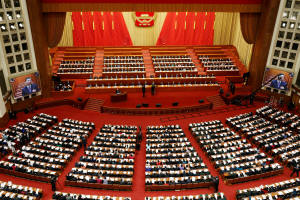Union matchmakers a turn-off, say Chinese web users as birth rate debate
heats up
 Send a link to a friend
Send a link to a friend
 [March 09, 2022] By
Brenda Goh and Albee Zhang [March 09, 2022] By
Brenda Goh and Albee Zhang
SHANGHAI (Reuters) - Proposals for
matchmaking committees within unions and a drive to encourage more
graduate students to have babies triggered a frosty reception on social
media, as officials brainstormed ways to raise China's plunging birth
rate.
In all, delegates to China's annual meeting of parliament submitted more
than 20 suggestions for ways to produce more children in a country that
did not scrap a decades-long policy restricting couples to a single
offspring until 2016.
The plan from a Communist Party secretary at a pharmaceutical firm in
Hubei province for "marriage committees" within trade unions to provide
matchmaking services, was widely criticised on Weibo, China's equivalent
of Twitter.
"Marriage is for happiness, not to meet goals," said one critic.
Also panned was another suggestion that masters and doctoral students
should be encouraged to marry and reproduce.
"So I'm studying a masters to birth a baby for you? Why not establish a
school (for this), where people can graduate once they've given birth to
enough," wrote one user in a post that got about 5,000 likes.

The steep decline in China's birth rate to last year's record low,
fuelled in part by the high cost of raising children in cities, has been
met with growing alarm by officials.
Last year, China announced that couples could have up to three children,
in a major shift, but the decision was met with doubts over whether it
would make much difference and questions on what supportive measures
would be rolled out.
[to top of second column]
|

Chinese President Xi Jinping are seen on screens as delegates attend
the second plenary session of the National People's Congress (NPC)
at the Great Hall of the People in Beijing, China March 8, 2022.
REUTERS/Carlos Garcia Rawlins
 Other proposals submitted to the
National People's Congress, which started on Saturday and finishes
on Friday, focused on ways of alleviating pressures facing families
and working women.
They included preferential tax policies, waiving kindergarten fees
for a third child, and penalties for employers who discriminate
against parents with multiple children.
Although proposals submitted by ordinary delegates at the
rubber-stamp parliament are largely symbolic, they allow matters of
public concern to be discussed and in theory will also be considered
by policy-making committees.
Many Weibo users took the opportunity to criticise the historic
tactics China had taken to control population growth.
"This is crazy, when it was the time of family planning there was
forced sterilisation and abortion," said one user whose comment
received over 2,000 likes. "Now they want three children. Are women
just machines?"
(Reporting by Brenda Goh in Shanghai and Albee Zhang in Beijing;
Additional reporting by Shanghai Newsroom; Editing by Tony Munroe
and John Stonestreet)
[© 2022 Thomson Reuters. All rights
reserved.] This material may not be published,
broadcast, rewritten or redistributed.
Thompson Reuters is solely responsible for this content. |